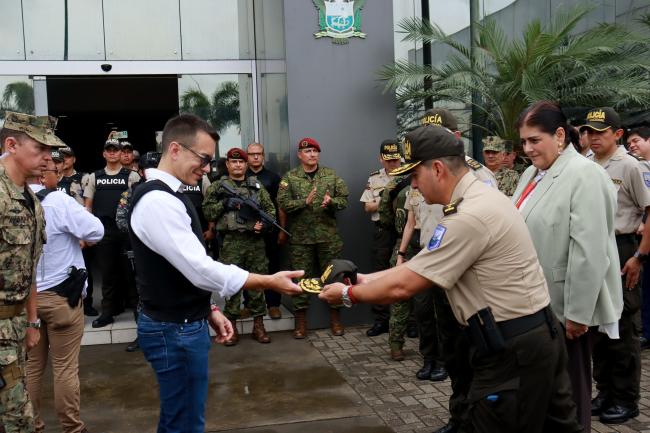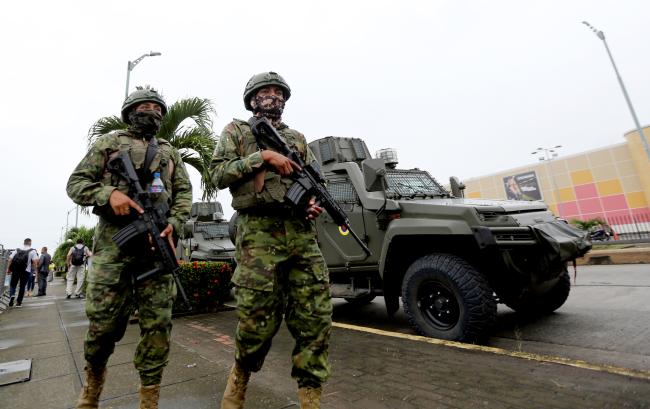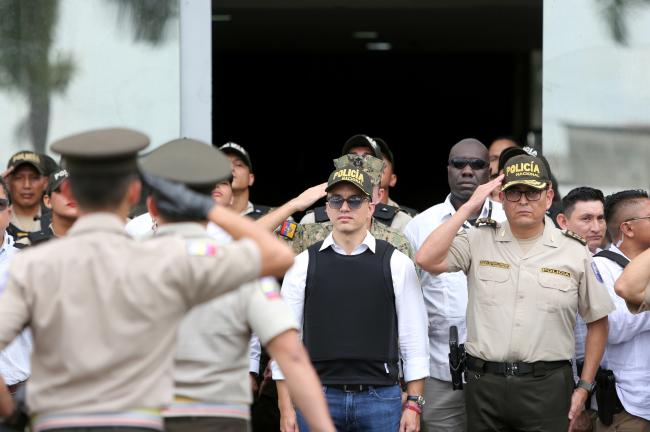
Ecuador has now been at war with crime for four weeks. On January 9, recently inaugurated president Daniel Noboa declared a state of “internal conflict” amid a spike in violence marked by high-profile prison escapes, burned cars, night bombs, and police kidnappings. During the darkest episode, a group of masked and armed individuals burst into the national TV channel TC Television in the city of Guayaquil, holding staff hostage during a live broadcast and shouting: “You don’t mess with the mafia.”
“Word of mouth says they were paid $1,000 each,” a resident of Guayaquil who asked to remain anonymous said of the assailants. “But I cannot guarantee if it’s true.”
Situated between two major cocaine producers Colombia and Peru, Ecuador remained relatively isolated from organized violence despite the presence of organized criminal groups, until 2018 when the murder rate began to surge. In 2023, there were 46.5 murders for every 100,000 people, one of the highest homicide rates in Latin America. Almost half of the killings took place in the coastal province of Guayas, where Guayaquil is located.
Fernando Carrión, security expert and professor at the Latin American Faculty of Social Sciences (FLACSO), relates this surge of violence to an increase in global cocaine production in 2020 and 2021. With the economic crises unleashed by the pandemic, criminal groups looked for new markets. “This means more consumption in Latin America and especially Europe,” he explained in a webinar organized by the Centre for Studies and Development Promotion (DESCO). “Ecuador became strategic.”
In 2019, Ecuador’s National Direction for Antidrug Investigations seized 79.5 tons of illicit drugs. Three years later, this amount more than doubled, reaching 201 tons.
According to the Ecuadorian Observatory on Organized Crime (OECO), today major international criminal organizations such as the Sinaloa and Jalisco New Generation cartels and the Balkan mafias have all made pacts with local gangs. This renewed international relevance led to an increase in infighting between local criminal gangs. According to Insight Crime, the murder of Los Choneros founder Jorge Luis Zambrano, alias “Rasquiña,” in 2020 sparked a conflict with a coalition of other local groups, such as the Lobos, Tiguerones, and Chone Killers.
According to Carrión, institutions aimed at controlling criminal groups have been weakened since 2017. “We used to have a ministry for security coordination, a Ministry of Justice and a Ministry of Interior, and also an institution aimed at designing antidrug policies.” Then, beginning with the administration of Lenín Moreno, “the Ministry of Government took over all the duties,” Carrión explained. This process was further consolidated under conservative former President Guillermo Lasso.
Declaration of Internal Conflict
Decree 111, issued by Noboa in January, classified 22 criminal groups as internal enemies. Coordination of policing duties was handed to the army. For Salesian Polytechnic University law professor Mauro Andino Espinoza, this implies leniency in the use of lethal force. “In an internal conflict, the principles of proportionality and rationality in the use of force can be softened because it’s harder to grant them. This doesn’t mean that they shouldn’t be respected,” he said in an interview.
In a statement, Ecuador’s Alliance of Organizations for Human Rights expressed concern about possible abuses against civilians. “Without enough guarantees, anyone can become a victim of the excesses of the two actors of this conflict—state and non-state,” posted the group on X.
Despite these concerns, militarization has so far received widespread support. In the latest poll by the research institute Comunicaliza, 80 percent of respondents back Noboa. A few hours after the TC Television assault, the National Assembly approved a motion to support the police and army. Even former President Rafael Correa—the de facto leader of the Citizen Revolution party that challenged Noboa in the recent elections—rushed to X to declare it was time for national unity saying, “Organized crime declared war on the state, and the state will prevail.”

Andino Espinoza and human rights groups are deeply concerned about this unanimous and often acritical support, especially when it promises to pardon military officers for potential wrongdoing. “It can open the door to some arbitrariness or excessive use of force,” he said. He pointed to abuses under a 1992 state of exception in the name of combatting crime, when the military killed three innocent civilians.
Militarization is Not the Answer
As of February 7, the military has detained 6,341 people, 241 of whom were labeled as terrorists. According to the Ministry of Government Mónica Palencia, daily murders have decreased from 28 to ten in the last two weeks.
“These measures are meant to extinguish the blaze and they are appropriate because they succeeded in cutting down the wave of violence and restoring peace in society,” said Carla Álvarez, a professor at the Security and Defense School of the National Institute for Higher Studies. But she also stresses that an iron fist will not solve the situation in the long run.
“Militarizing is not enough in a context of high criminality,” she said, explaining that many people chose to join organized criminal groups out of necessity. The pandemic pushed people to join “informal” or “illegal” activity.
A resident in Guayaquil who claimed to have some knowledge about the gang that raided the TC Television believed that those involved fit this description. “Some of them were raised by a single mother who had to go out looking for bread. The children stayed at home alone. That’s when they were approached by these groups,” he said, asking to remain anonymous.
With 18.5 percent of the local population aged 15 to 24 unemployed and not attending school, gangs have filled a rising gap in local economies and neighborhoods.
Anastasia, a 60-year-old resident of the outskirts of Guayaquil who asked to use a pseudonym, says she saw criminal groups in her borough beefing up due to drastic social service cuts in 2017. “The state had abandoned the peripheral neighborhoods. Since then, we have been drifting away,” she said.
On the other hand, experts stress that the fight against organized crime cannot proceed without reforms to target corruption and money laundering. “The Ecuadorian economy is a laundry of dirty money,” Luis Córdova-Alarcón, an expert in conflict and violence at the Central University of Ecuador, said in an interview. Córdova-Alarcón recommends strengthening state control of the economy and deeper investigations into laundering.

Security Reforms
Mobilizing the army in the streets requires funding. To finance internal war, the government proposed to raise the value-added tax on non-essential items from 12 to 15 percent, but the National Assembly rejected the bill. For Álvarez, the government proposal indicates that the involvement of the army is likely to last longer than the 60-day state of emergency declared by Noboa.
In keeping with his campaign promise, at the beginning of January, Noboa sent 11 queries to the Constitutional Court to convene a popular referendum. A few days later, he submitted an expanded set of questions.
On January 24, the Constitutional Court gave the green light to ten out of the 19 questions. Citizens will be asked if they agree with tasking the army with carrying out searches on the premises of prisons, allowing the seizure of criminal assets, and applying tougher punishments for charges such as drug trafficking, murder, money laundering, and illegal mining.
On the other hand, the Court blocked nine of Noboa’s proposed queries, including questions on the increased involvement of the army in the fight against organized crime, the deportation of foreign citizens, the possibility of presidential pardons for law enforcement officers, and the establishment of national interest zones to combat illegal mining.
Four additional questions were flagged for further examination. Those regard the extradition of Ecuadorian citizens, the establishment of tribunals specialized in constitutional law, and other issues unrelated to security, such as labor deregulation and the adoption of international arbitration to attract foreign investment.
Ramiro Ávila, a law professor at the Simón Bolívar Andean University in Quito and former Constitutional Court member, notes some queries were confusing; the government could achieve many of the proposals through laws or executive acts. What worries him is the integration of seemingly unrelated topics, especially while in crisis. “In the middle of the noise brought up by the fear of becoming victims of the organized mob, we will end up agreeing on everything." Ávila calls this a “democratic disaster.”
Others have gone further in their critiques. Economist Pablo Dávalos believes the government is applying a kind of shock doctrine. “The security crisis has provided Noboa with an ideal argument to implement structural reforms,” Dávalos wrote in a widely-circulated opinion piece.
So far, Noboa has justified the inclusion of unrelated queries, saying they are needed to reactivate the economy, create jobs, and guarantee foreign investment.
Plan Colombia 2.0?
One thing that concerns Ávila about the ongoing debate is the lack of scrutiny of other regional experiments in which countries have adopted military strategies to fight crime to limited effect. “Ecuador is acting like Plan Colombia or the War on Drugs in Mexico never happened,” he said.
Mobilizing militaries to combat drug trafficking and insecurity with billions of dollars of U.S. aid, both strategies produced widespread human rights abuses while failing to stem drug production and transport.
Today, Ecuador moves along the same route. On January 22, Noboa met with the U.S. special envoy for Latin America Christopher Dodd and the commander of the U.S. Southern Command. During the meeting, they agreed on strengthening cooperation in security and defense, as well as stepping up economic inversion and exchange.
“We cannot keep accepting policies developed in 1971 by Richard Nixon. It has achieved no results so far,” explained security expert Carrión. He is deeply skeptical. “What happened in the last week will become cyclical. There will be a setback, a tense peace, and then another epicenter will appear.”
For most Ecuadorians, a long-term view of security policy is a privilege that few can afford.
“The government should deploy more soldiers to keep criminals in check. We cannot even trust our sons anymore,” said 38-year-old janitor Jenny right after the assault on TC Television.
Despite being critical of the lack of a long-term strategy, Álvarez believes that the new government deserves an opportunity. Noboa assumed the presidency in November 2023. “We must give him a chance,” she said. “But anything he does in the long run will require a strong purge of the police, of the army, and of the judges too.”
Michele Bertelli is a journalist and video producer currently based in Ecuador. He covers migration, human rights, and the environment. His work has appeared on Al Jazeera English, Politico EU, Der Spiegel, and El País. He also works as an associate editor for the think tank ISPI.

